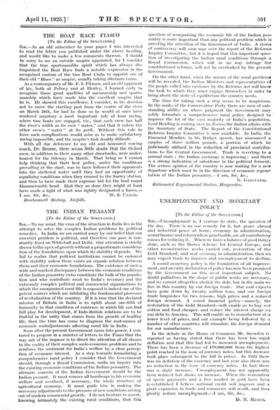THE INDIAN PEASANT [To the Editor of the SPECTATOR.] SIR,—To
my mind, the crux of the situation in India lies in the attempt to solve the complex Indian problems by political remedies. In India we are carried away by our belief that our essential problem is political, and therefore our gaze is con- stantly fixed on Whitehall and Delhi. Our attention is chiefly drawn to the apex of growth without a proportionate considera- tion of the foundations upon which its stability depends. We fail to realize that political institutions cannot be endowed with stability unless there exists an organic relation between them and their economic foundations. The existence of such a wide and marked discrepancy between the economic conditions of the Indian peasantry (who constitute the bulk of the popula- tion and who contribute most to India's revenue) and the extremely complex political and commercial organizations to which the unorganized rural life is exposed is indeed one of the potent sources which are inhibiting the fundamental processes of revitalization of the country. If it is true that the declared mission of Britain in India is to uplift about one-fifth of humanity to that condition of existence in which life can find full play for development, if Indo-British relations arc to be fruitful in the unity that comes from the growth of healthy life, then the time has come to diagnose the root-causes of economic maladjustments affecting rural life in India.
Soon after-the present Government came into power, I ven- tured to propose in a number of letters to the Times that the way out of the impasse is to direct the attention of all classes
to the reality of their complex socio-economic problems and to reinforce the sentiment for India's welfare by a clear percep- tion of economic interest. As a step towards formulating a comprehensive rural policy I consider that the Government should, through a Royal Commission, make an inquiry into the existing economic conditions of the Indian peasantry. The ultimate concern of the Indian Government should be the Indian peasant. It must remove all handicaps to his economic welfare and overhaul, if necessary, the whole structure of agricultural economy. It must guide him in making the necessary adjustments to the pressure of new conditions arising out of modern commercial growth. I do not hesitate to assert, knowing intimately the existing rural conditions, that this
question of reorganizing the economic life of the Indian pea. santry is more important than any political problem which is arresting the attention of the Government of India. A storm of controversy will soon rage over the report of the Reforms Inquiry Committee, but it is hoped that this important ques- tion of investigating the Indian rural conditions through a Royal Commission, which will in no way infringe the constitutional reforms, will not be overlooked by the present Government.
On the other hand, when the nature of the rural problems will be revealed, the Indian Ministers and representatives of the people called into existence by the Reforms Act will know the task to which they must engage themselves in order to bring about the state of equilibrium the country needs.
The time for taking such a step seems to be auspicious.
In the ranks of the Conservative Party there are men of out- standing ability on whose judgment the Government may . safely formulate a comprehensive rural policy designed to improve the lot of the vast majority of India's population. Lord Reading is coming over to discuss the Indian affairs with the Secretary of State. The Report of the Constitutional Reforms Inquiry Committee is now available. In India, the Financial Member, in his Budget speech, has announced a surplus of three million pounds, a portion of which he judiciously utilized in the reduction of provincial contribu• tions to the Central Government. Trade is reverting to a normal state ; the Indian exchange is improving ; and there is a strong indication of subsidence in the political ferment. The serious opinion of the country is now waiting for a new departure which must be in the direction of economic regene- ration of the Indian peasantry.—I am, Sir, &e.,
N. GANOULEE.
Rothantskd Experimental Station, Harpenden.










































 Previous page
Previous page